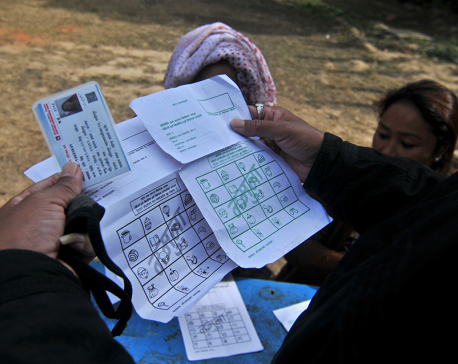
OR
Second phase election
On the eve of the second phase of local election scheduled for June 28, Republica has been holding regular interactions with people from all over Nepal. During these interactions one issue keeps coming up regularly. Far too many Nepalis are still unconvinced that the second phase on June 28 will take place as planned. The electorate for the second round also appears rather confused about the right way to vote. It is clear that Prime Minster Pushpa Kamal Dahal’s resignation, the delay in election of the new prime minister and continued deadlock over the participation of Rastriya Janata Party Nepal (RJPN) in the second phase have all confused prospective voters and they are still unsure whether they will be able to vote freely and fearlessly. Some even question whether the second phase will be held at all. This has to be seen as collective failure of our political class. The Nepali Congress-CPN (Maoist Center) coalition has not done enough to take the RJPN into confidence; the RJPN for its part has not helped by constantly shifting its goalposts; and CPN-UML, the main opposition, has also been acting rather irresponsibly in choosing to continuously obstruct the sovereign parliament over an issue that has nothing to do with the legislative.
Perhaps our political actors don’t realize the extent of the confusion they have created in the minds of prospective voters of province number 1, 2, 5 and 7 that go to election on June 28. In light of the large number of ballot papers that were declared ‘invalid’ after the first phase, the Election Commission has been assuring people that voter-education for the second phase will be far better. For instance, it has now made it mandatory for around 1,200 volunteers it is deploying for voter-education to reach each and every household of the four provinces. One member from each household will have to sign on a document, thereby attesting that he or she has fully understood how to vote. Yet few of the respondents that Republica talked to in these four provinces had not gotten any such voter education. Why this mismatch between the claims and actual actions of the Election Commission? And if indeed voter education is happening, why has it been so slow?
It is not a healthy sign that with barely three weeks to go to for the second phase scheduled for June 28, so many prospective voters are unconvinced about the government’s ability to create favorable climate for election. If they fear violence or that their votes too will be declared invalid, many of them might be persuaded not to vote at all.
It is one thing for people to feel compelled to vote for their friends and family members who will stand in local election, out of a sense of solidarity and kinship. It’s a different thing to make them enthusiastic to vote, to push for the political and social change they desire. This is why it is vital that all outstanding issues hampering the formation of new government are quickly settled and the new government is up and running as quickly. To regain some of the credibility it has lost since the declaration of local election, the Election Commission—which stands accused of doing the bidding of the ruling parties—also needs to do a far better job of educating prospective voters.
You May Like This

Voters in a fix due to ineffective voter's education
SIRAHA, Dec 6: Ineffective voter education in rural, as well as urban areas of Siraha, as increased the fear of invalid... Read More...

Voters complain of confusion while casting ballot
POKHARA, May 15: Although most of the places in Kaski district reported holding the local elections successfully, many voters were not... Read More...

Dispute over the addition of fake voters protracts NSU election
KATHMANDU, Aug 14: The holding of the election of the Nepal Students Union (NSU) under its 11th General Convention is... Read More...





Just In
- Kushal Dixit selected for London Marathon
- Nepal faces Hong Kong today for ACC Emerging Teams Asia Cup
- 286 new industries registered in Nepal in first nine months of current FY, attracting Rs 165 billion investment
- UML's National Convention Representatives Council meeting today
- Gandaki Province CM assigns ministerial portfolios to Hari Bahadur Chuman and Deepak Manange
- 352 climbers obtain permits to ascend Mount Everest this season
- 16 candidates shortlisted for CEO position at Nepal Tourism Board
- WB to take financial management lead for proposed Upper Arun Project






_20220508065243.jpg)







Leave A Comment